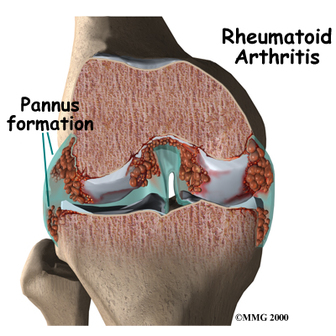|
Rheumatoid Arthritis (RA) is a chronic, or long-term, inflammatory form of arthritis. RA is considered an autoimmune disease, in which your immune system attacks the tissues of your own body. In RA, the immune system mostly attacks tissues in the joints, but it can also affect other organs of your body. In some people, RA seems to run its course and does not gradually get worse. In others, RA gets progressively worse and leads to the destruction of joints. RA can greatly affect your ability to move and do normal tasks. RA can appear at any age, but most patients are between the ages of 30 and 50. About two million Americans have RA, and most of them are women. RA can affect children and when it does, it is termed Juvenile RA. How does Rheumatoid Arthritis develop? In RA, two processes are occurring in the joints. First, the immune system causes inflammation in the synovial membrane, called synovitis. The synovial membrane is the thin tissue that surrounds all joints. The synovitis is characterized by extra fluid, swelling, and warmth of the joint due to the increased blood flow. The second process causing the problems in RA results from the ongoing or repetitive synovitis. The blood cells and the swollen membranes of the synovium release chemicals into the synovial fluid (the lubricating fluid of the joint) that can break down or damage the tissues of the joint. This breakdown can cause permanent damage to the cartilage, bones, ligaments, and tendons inside and around the joint. The structural damage usually happens in the first to third year of the disease. The synovitis can come and go, but the structural deterioration progresses and results in permanent damage. As a result, the joint becomes chronically painful and very difficult to move. RA usually affects many joints on both sides of body (for example, both knees, both ankles, both wrists, and the same joints in both hands may be affected.) Research indicates that almost all the joints that will be affected long term show symptoms of RA in the first year of the disease. This means that each joint may continue to get worse, but you probably won't have many more joints that will develop the symptoms of RA. Most RA patients also have inflammation in the tendons around the joint. (Tendons connect muscle to bone.) Nodules, or bumps, may form on the tendons, or the tendon sheath (the membrane that surrounds the tendon.) Most people think of RA as an inflammatory disease of just the joints and related tissue, but it is actually a systemic disease meaning that it affects the whole body. In general, inflammation causes symptoms of swelling, redness, heat, and pain. RA can even show up in organs such as the heart, blood vessels, lungs, and eyes. Sometimes RA occurs in joints and other organs, and sometimes it occurs only in other organs. RA works somewhat differently outside the joints, but the underlying problem is still damage to the tissue and loss of function. Rheumatoid factor (RF) is an antigen found in about 85 percent of RA patients. Not all patients with RA have RF in their blood. Some patients with RA do not have RF, and people with RF can have forms of arthritis that are not RA. Being RF positive, however, increases your likelihood that your organs will also be affected by RA. Causes No one knows exactly what causes RA. There are probably different causes in different people. Many doctors and researchers think that a virus or bacteria might cause RA. So far studies have not proven this. Researchers do know, however, that bacteria can cause swelling in the synovial membrane. Heredity, or your genes, play a part in RA. The disease tends to run in families. If a close relative has RA, you are 16 times more likely to develop the disease yourself. Learn more about Rheumatoid Arthritis Symptoms.
0 Comments
Your comment will be posted after it is approved.
Leave a Reply. |
Our BlogRead here for more information about our practice, industry news, tips for taking care of your body, and great recipes for healthy living. Categories
All
|


 RSS Feed
RSS Feed